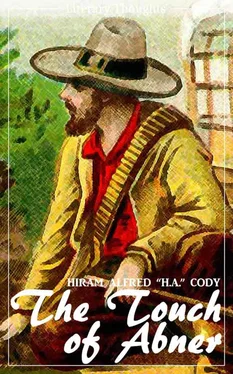"Certainly," Jess replied as she acceded to his request. "But I think you might tell me what makes it so dangerous, daddy."
"High explosives, that's what 'tis. It's worse than nitro-glycerine, which goes off jist as soon as ye look at it."
"But you should not carry it, then, daddy. If it is not safe for me to touch, neither is it for you, so there."
"Oh, I know how to handle it," Abner chuckled, as he thrust the paper back into his pocket. "Climb up now, an' let's be off."
"There is something in it you don't want me to see; isn't that it?" Jess asked.
"Mebbe there is. Anyway, I don't want to be blown to bits. Whoa, there, Jerry. What's the matter with ye? Take the reins, Jess, an' hold that hoss. He's jist dyin' fer an explosion. I kin tell it by the way he twists his ears."
As soon as Abner had hoisted the trunk up into the express, he climbed over the wheel, took his seat by his daughter's side, seized the reins, and headed Jerry for home.
"You didn't take the truck back," Jess reminded him as soon as they had started.
"Well, neither I did! But, never mind, Sam'll git it. He might as well be doin' somethin', the lazy rascal. It's his bizness to wait on the public, an' we're as much the public as anybody. G'long, Jerry."
"My, I'm glad to be back," and Jess gave a deep sigh of contentment. "I never saw the fields look so pretty, nor the trees such a wonderful variety of green. I missed all that at the Seminary. That beautiful maple over there in front of Mr. Sanders' house seems to have grown since I went away."
"H'm," Abner grunted, "Joe should cut that down; it hides the view."
"Oh, daddy, don't say that. Just think what such a tree means. There is so much in it."
"Y'bet there is; more'n a cord of good firewood."
"I don't mean that, daddy. I wasn't thinking of the wood, but of the beauty of form and color on golden, summer days, and the mystic music when the wind is rushing through its branches."
"Oh, it's them things ye'r thinkin' of. Well, mebbe ye'r right. But a piece of good dry maple in our old stove on a cold day in winter gives all the poetry an' music I want. Guess ye've been studyin' sich things at the Seminary, eh?"
"For a time we did. But this last term most of us were greatly interested in Social Service studies."
"Ye don't tell! What's that, anyway? A new kind of religion or prayer-meetin', eh?"
"Oh, no," and Jess laughed merrily. "It is merely social reform, that is, efforts to lessen and remove existing evils."
"Well, that's interestin'. Pretty big problem, I should say; almost as hard as clearin' a dog's hide of fleas."
"Much harder, daddy. You see, we have to deal with human nature at its lowest, and elevate it step by step."
"Oh, now I begin to spy daylight. Ye'r to be a kind of human elevator, sich as they have in big stores, which boosts ye from cellar to garret quicker'n ye kin say 'jack-rabbit.'"
"It's something like that, only this is a long and difficult work, needing no end of patience. It means not only fighting such evils as the liquor traffic, horse-racing, gambling, graft and such things, but we must educate people as to the proper training and welfare of children, and teach them how to keep their houses clean and free from diseases. I could not begin to tell you all the subjects Social Service includes."
"It sartinly must cover a heap of ground," Abner mused, as he flicked Jerry gently with the whip. "But does it tell ye how to cook, darn socks, sew on buttons, an' do sich ordinary household work?"
"Why, no!" and Jess looked her surprise. "It's not supposed to include such things."
"H'm, is that so? Well, it seems to me that's the kind of social reform we need. Most of the gals these days tweedle-dee at the pianner, gass about art, study the fashion magazines, an' read the new novels, but as fer cookin', sewin', an' darnin', why, they know no more about sich things than a cat knows about a thrashin' machine."
"But I know, daddy," Jess reminded. "Mother taught me, you remember, before I left home."
"Sure, she did, an' she larnt ye well, too. She laid the timbers all right, keel, kilson, an' all. But, skiddy-me-shins, if ye'r goin' to carry all that Social Service sail, ye'll be a mighty different craft from what ye'r mother planned. Ye sartinly won't do fer ordinary home waters, let me tell ye that. Ye'll need a darn more sea room than kin be found at Ash Pint."
"Certainly, daddy, that's just it. I intend to go to some big city where the needs are great, and help to carry on social reform work."
"Ye do!" Abner's hands dropped limp upon his knees, and a troubled expression overspread his wrinkled face. The merry twinkle left his eyes, and the wrinkles upon his bronzed forehead seemed to deepen. "Why, I thought ye was a-goin' to stay home, Jess," he at length continued. "Ye'r ma an' me was settin' great store upon ye'r comin' back, an' castin' anchor at Ash Pint."
"I couldn't think of doing that, daddy. And besides, you have already said that I am not fitted for home waters, didn't you? I certainly do need more sea room."
"But couldn't ye take a reef or two in ye'r sail, Jess? There's considerable social work to be done right here, so why not cruise around a while in this parish? I guess ye'll find enough to keep ye busy fer a year or two at least."
"Why, what can I do, daddy?"
"Well, I can't recall all the needs. But there's Glucom, fer instance. It's right handy, an' it needs its back yards cleaned up, an' other things attended to; it sartinly does. Ye might start with Ikey Dimock, an' Lawyer Rackshaw, an' I think ye'd find enough in their cellars an' basements to occupy ye fer a long time."
"Why, daddy, I didn't know their places needed looking after. Their wives are leaders of Glucom society, and surely conditions are not as bad as you make out."
"I'm not sayin' anythin' about their wives, fer I've learned since marryin' ye'r ma to speak very keerful about women. I was merely referrin' to the men. But, remember, society ain't allus what it seems, fer many a frog kicks up a big fuss an' holler on a rotten log, an' roosters often crow the loudest on a manure heap. I guess if ye knew as much as I do about the way Ikey Dimock an' Lawyer Rackshaw, to say nuthin' of others, made their money ye'd find that I'm not fer astray. G'long, Jerry."
"But what could I do with such people, daddy? They would resent any interference on my part. They are leaders of society, you know. We work among a different class of people."
"Yes, I suppose so. But ye told me that Social Service work includes the liquor traffic, gamblin', graft, an' sich things, so that's why I mentioned Glucom. It's sartinly a fine field fer operations."
"I shall think it over, daddy," and Jess gave a deep sigh. Abner's eyes twinkled, and he glanced toward his daughter.
"S'pose ye try ye'r hand at home, Jess," he suggested.
"In what way?"
"Oh, upon me an' ye'r ma. We need a little reformin', an' the old house wants to be made a darn sight more sanitary than it is."
"Why, what do you mean?" Jess asked in surprise.
"Well, ye see, me an' ye'r ma haven't been sproutin' any extry angel-wings since ye left home, Jess. We've been havin' too much of each other's company, I guess, an' ye know that ye git tired even of the best candy an' chocolates if ye have too much of 'em. Then, we've been livin' in the kitchen, eatin' an' settin' there. We never use the dinin'-room, an' as fer the parlor, well, the blinds have been down fer so long that I have the creeps whenever I go into that room. No, it ain't sanitary. The house needs more sunshine; a cheery voice now an' then, an' some music on that old pianner once in a while. I tell ye the state of affairs at our house ain't nat'ral. A funeral is necessary occasionally, I s'pose, but ye'd think we was havin' a funeral at our house every day of the week. Yes, Jess, we need ye'r social reform work right at home as much as anywheres else. Hello! What's this?"
Читать дальше












